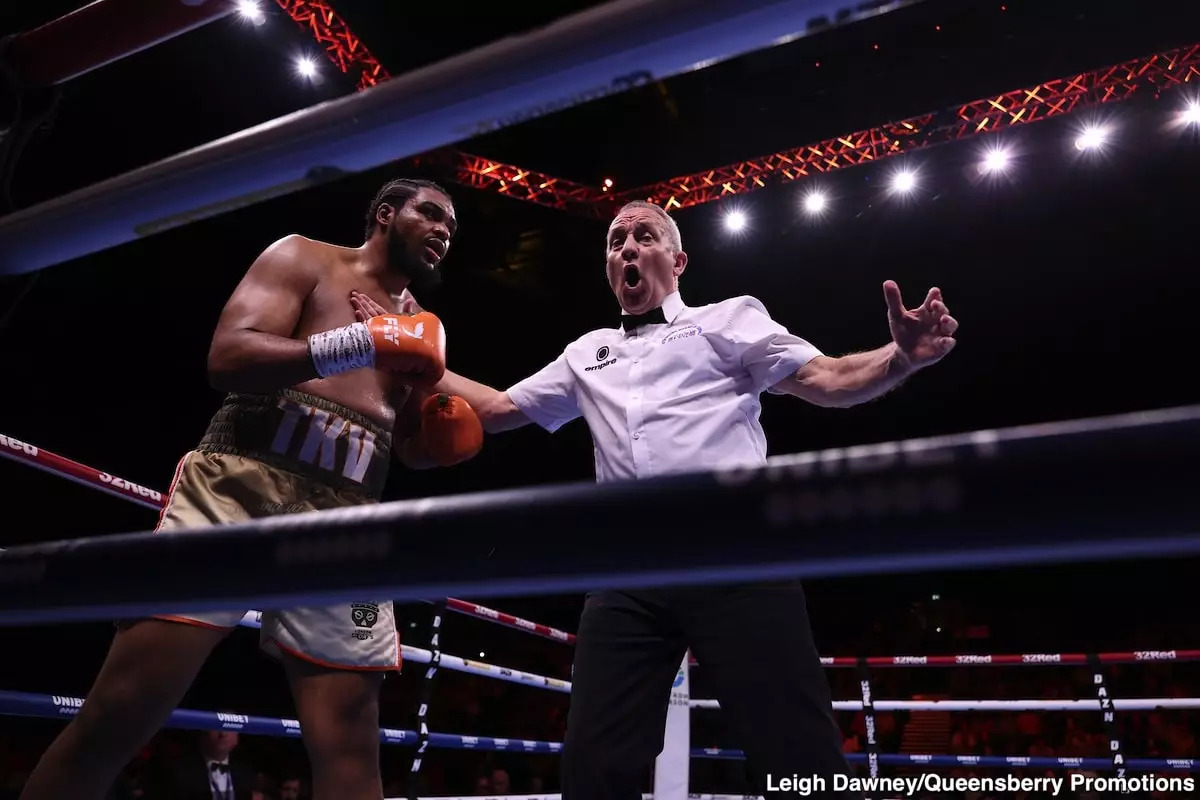The boxing world was treated to a night of electrifying matchups in Manchester, with the spotlight falling particularly on the vacant British heavyweight title bout between David Adeleye and Jeamie TKV. However, rather than a straightforward showcase of skill, fans were left reeling from a controversial ending that called into question the integrity of the officiating. As the bout progressed into the sixth round, a moment of chaos erupted; a situation that would lead to uproar among fans, pundits, and especially the fighters involved.
The situation escalated dramatically when referee Ron Kearney intervened to break the two fighters apart. In what appeared to be a standard procedure, Adeleye unleashed a left hook that landed flush on TKV’s chin the very moment Kearney called for a break. The timing of this punch, so close to the referee’s command, sparked immediate debate over whether the strike should even be considered legal. Kearney had ostensibly followed protocol yet allowed this fight-altering blow to unfold while TKV was ostensibly still in a clinch and under the referee’s instruction to disengage.
Response from TKV’s Camp
Ben Shalom, TKV’s promoter, was not hesitant in expressing his outrage regarding the incident. Characterizing the referee’s actions as “disgraceful,” Shalom stated that this event was among the most troubling he had witnessed during his career in boxing. His vehement assertion relied on the premise that Kearney not only called for a break but even physically facilitated the separation, making it exceptionally perplexing that he would then permit a knockout punch to land as TKV complied with his command.
Shalom’s opinion that his fighter had been unfairly treated is one shared by many boxing enthusiasts who saw TKV performing commendably until that fateful moment. The promotion of TKV’s apparent superiority during the match raises serious questions about the fairness of the outcome. Shalom’s calls for an official appeal indicate an intention to challenge the legitimacy of the fight’s result, a move that highlights the dissatisfaction with the judging and officiating that can sometimes overshadow the sport.
The Reactions and Implications
As the aftermath of the fight unfolded, further discussions began to swirl within the boxing community. The British Boxing Board of Control now faces critical pressure to address the perceived mishap regarding refereeing. Historically, appeals such as this have been met with lukewarm responses, yet each instance further damages audience trust in the sport’s regulatory bodies. This recent incident adds to a growing narrative where applicable oversight appears insufficient, ultimately jeopardizing the careers and reputations of the fighters involved.
Meanwhile, the potential rematch between the two combatants becomes clouded by this new drama. While some audiences might be eager for closure following the controversial ending, the actual boxing exhibited during the fight has been characterized as less than thrilling. Much of the bout was marked by a slow pace leading up to the dramatic incident, leaving many to question whether a rematch would yield different or more engaging results. TKV’s supporters argue that he deserves a fair shot to regain lost ground following what can justifiably be considered a cheap shot, while critics may point to the overall performance as insufficient motivation for a repeat match.
The Need for Enhanced Officiating Standards
This incident catalyzes a broader conversation surrounding the standards of officiating in boxing. It starkly emphasizes the need for systematic improvements within the sport, addressing the training of referees and their adherence to protocol in high-stakes matches. Critics often point to such events as symptomatic of a wider systemic failure that devalues the sport and the athletes who dedicate their lives to perfecting their craft.
As the dust begins to settle over this chaotic event, all eyes will be on how governing bodies respond to Shalom’s cries for justice. In a sport built firmly on the tenets of fairness and skill, it’s imperative that the integrity of the outcomes is maintained. Ensuring that fighters like TKV receive the recognition they deserve is essential for boxing’s credibility. As history has shown, moments of injustice not only affect individual careers but resonate throughout the sport, impacting the trust of the fans that keep the world of boxing alive.


Leave a Reply